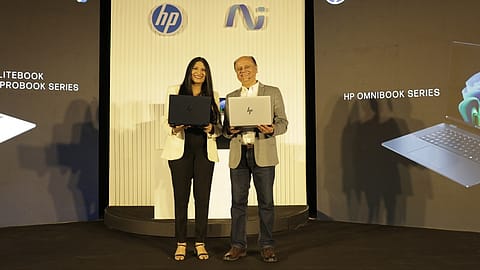AI for all: HP’s plan to bridge India’s digital divide with next-gen tech and grassroots training
At the launch of HP’s Next-Gen AI PCs in India, Ipsita Dasgupta, SVP & managing director of HP India, called attention to the country's strategic advantage — a young, tech-savvy population and an unmatched pace of digital adoption.

As generative AI reshapes global industries and workplaces, India is emerging not just as a fast adopter, but as the frontline of what’s next in the future of work. At the launch of HP’s Next-Gen AI PCs in India, Ipsita Dasgupta, SVP & managing director of HP India, called attention to the country's strategic advantage — a young, tech-savvy population and an unmatched pace of digital adoption.
“In India and eastern parts of the world, we see a lot of excitement and positive sentiment towards AI,” says Dasgupta, adding that the conversation in the West is comparatively more cautious. “We recognise that AI is going to be here to serve us as workers and consumers.”
From global GitHub activity to AI job hiring trends, the data points to India’s pivotal role. The country accounts for 19% of all global AI projects on GitHub — the second-highest in the world. “One-fifth of the world’s AI projects on GitHub are coming out of India… just imagine the role we are playing,” Dasgupta says.
According to her, one of the biggest transitions ahead is moving from a nation of coders to a nation of “prompters” — people who can effectively work with AI tools and models. This shift, she says, is what will define India’s productivity surge in the AI era.
That turning point, however, is unevenly distributed. Larger enterprises have the resources to experiment and implement AI, while smaller players — the MSMEs that make up 40% of India’s GDP — risk being left behind.
HP is attempting to bridge this gap through a dual approach: its HP Connect platform and AI immersion workshops. “Think of [HP Connect] as customer welcome and demo centres… but even more than that, it provides consulting services — it’s almost a CIO-as-a-service platform,” shares Dasgupta. These centres are being set up in tier-2 and tier-3 cities, close to MSME clusters, to make AI tools and training more accessible.
HP’s AI immersion workshops are aimed directly at MSME employees across finance, marketing, HR, and operations. With over 3,500 workshops already conducted, the company is targeting 10,000 sessions nationwide. “The highest value that AI can provide… is to be able to sit on a device at an endpoint and understand the value it can create for you in every single day,” she adds.
Recommended Stories
Beyond business, AI’s promise for social impact is gaining momentum — particularly in healthcare and education, sectors highlighted in India’s recent Union Budget. “From an education perspective, AI on the device adds tremendous value in customised learning for 200 million K–12 students,” says Dasgupta.
The healthcare sector, meanwhile, could see transformative gains by enabling India’s 600,000 general physicians — compared to a few thousand specialists — to make better diagnoses and treatment decisions using AI-enabled devices. “We’re working with government and industry on proofs of concept to drive value in these sectors,” she adds.
At the heart of this transformation, Dasgupta emphasises, are India’s workers. “India is not dealing with the future of work. India is the future of work,” she says. “Whether it’s a freelancer working from home or a worker on an enterprise floor, AI allows us to do our jobs better, with more balance, and focus on creating versus mundane work.”
For AI to truly integrate into the Indian economy, Dasgupta laid out four imperatives: it must be meaningful and outcome-oriented; inclusive and accessible; powerful enough to drive daily impact; and mainstream — not a luxury but a necessity.
(INR CR)
“It took me two months to open my first AI PC because I hadn’t yet imagined how it was going to change my day,” Dasgupta shares. But with initiatives across enterprise, social, and grassroots levels, HP is betting big that India is ready to embrace AI — not just as a technology, but as a cornerstone of the modern workforce.
